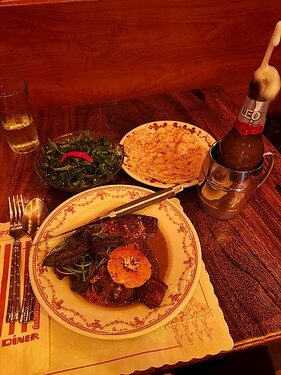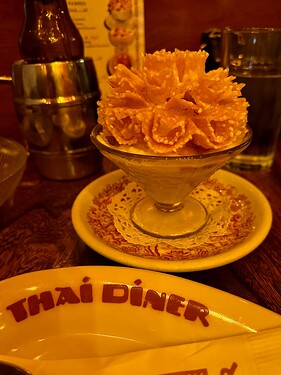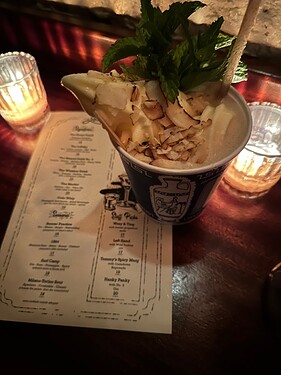This is answer to the question I posed a few months ago about getting a reservation in NYC… and it’s much more than robots…! Excellent reading for anyone interested in NYC restaurants, and investigative journalism!
So many quotes in this article… I’ve hidden them below.
Summary
“The average diner in New York City is massively disadvantaged, and they don’t even know it.
His list of possible approaches went like this: phone call, e-mail, Instagram D.M., in-person (“Before you leave a place, you could make another reservation. It’s a great way to get one”), texting someone you know (the maître d’, a chef, even servers and line cooks), hotel concierges (some residential buildings—432 Park Avenue, 15 Hudson Yards—have their own), élite credit-card partners (“Chase has tables, Amex has tables”), membership reservation clubs like Dorsia, new apps (TableOne claims to show every available publicly listed reservation at the most in-demand restaurants, in real time), secondary marketplaces (in the manner of ticket scalpers, Web sites like Cita Marketplace and Appointment Trader will sell you a reservation, often procured by a bot, usually made in someone else’s name), the restaurant’s Web site, and online-reservation systems (OpenTable, Resy, Tock, Yelp). Leventhal described this last category, by far the most common way to book a table, as “the land of democracy, the land of first come, first served.” Then he smirked and said, “In theory.”
10:03: “Everything but the later tables have booked,” Giordano said. 10:06: fully committed.
Appointment Trader cleared almost six million dollars in reservation sales during the past twelve months, a more than twofold increase from last year.
Frey designed an algorithm that determines the most popular places based on reservation requests; in New York, 4 Charles, Tatiana (an Afro-Caribbean place at Lincoln Center), and COQODAQ (Flatiron Korean fried chicken) currently top the list.
So who are the resellers, mercenaries, and hustlers who provide Appointment Trader with prime tables? Some are people who sit with OpenTable or Resy pulled up on their laptops every morning, amassing reservations in various names. Some are kids who borrow their parents’ Amex black cards, telephone Amex’s Centurion concierge, and book hard-to-get tables that are set aside for card users. Others call in favors with friends in the industry, bribe maître d’s, or e-mail reservationists.
“It’s, like, some people play Candy Crush on their phone. I play ‘Dinner Reservations,’ ” he said. “It’s just a way to pass the time.” Last year, he made eighty thousand dollars reselling reservations.
It also notes that he made almost two thousand reservations that never sold—a restaurateur’s nightmare.
Several bots might be simultaneously checking the app, ten or even a hundred times per second, twenty-four hours a day, until one finds the eight-o’clock table
Some resellers subscribe to such sites as Resy Sniper (fifty bucks a month), which uses custom-built bots to snag tough reservations
restaurant employees (maître d’s, hosts, line cooks) also sell tables on Appointment Trader, risking their jobs for quick cash
Meyer became an early investor in OpenTable, and, later, in Resy. Last year, he invested in an A.I.-powered reservation platform called SevenRooms. SevenRooms, Resy’s newest competitor, has a tool that has largely automated that process: an algorithm picks which diners get priority push notifications about late openings. The criteria include how often a diner visits, how big his or her tabs are, how much wine and dessert are ordered, and tip size. SevenRooms scans customers’ bills, tracks referrals, and monitors guests’ online reviews; people who frequently cancel or no-show can be required to provide a credit-card deposit.
Resy has a data-driven feature called Notify, which puts diners on a waiting list for a restaurant. I added my name to the Notify list at every fully booked restaurant in my neighborhood, over a six-week period. I didn’t get a single e-mail or notification.
I thought I just had bad luck, until a conversation with Resy’s C.E.O., Pablo Rivero, clarified things. If you have one of these cards (Centurion: ten-thousand-dollar initiation fee, five thousand dollars per year), Rivero said, “You will get a Resy notification before other people do.”
Guest data is not shared between restaurants with different owners, but platforms like SevenRooms and Blackbird want to change that.
four out of five restaurants close within five years
When the reservations go unsold, it’s the restaurant that loses.
“I’ve been called here to wait at least a hundred times,” Kimura had told me. The going rate for an afternoon in line at Lucali is fifty-five dollars, a percentage of which goes to the company.



